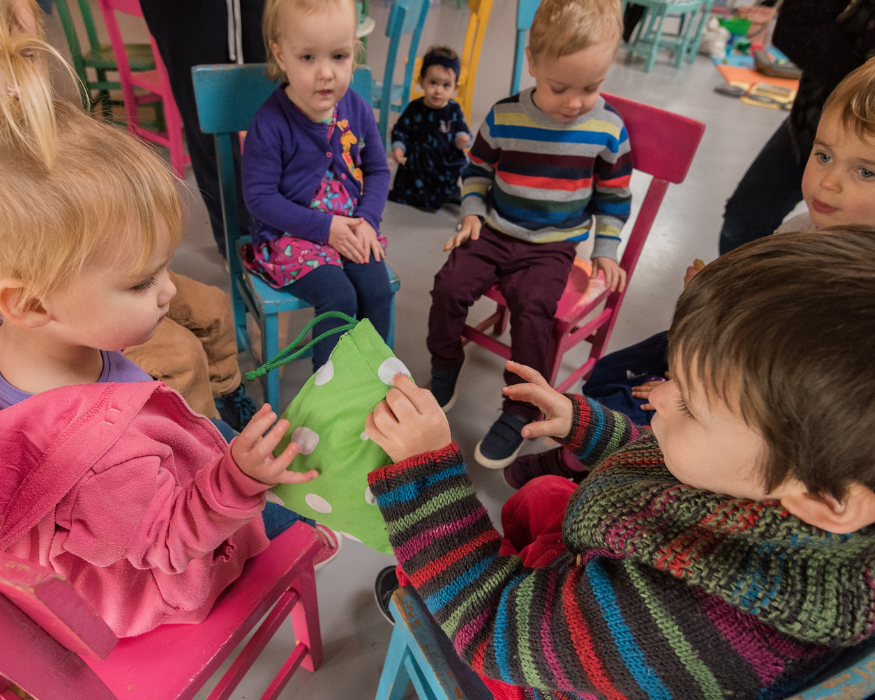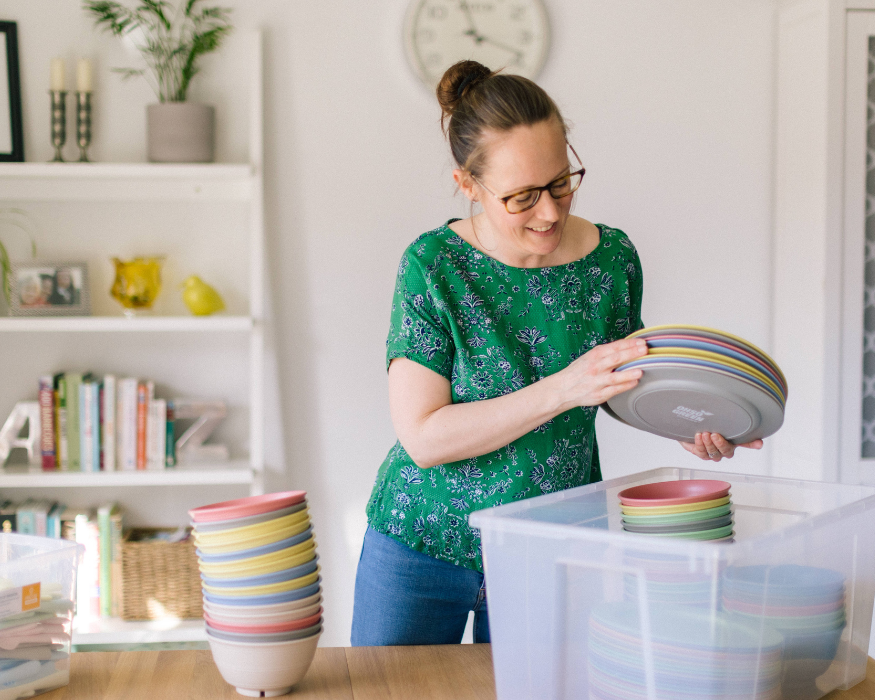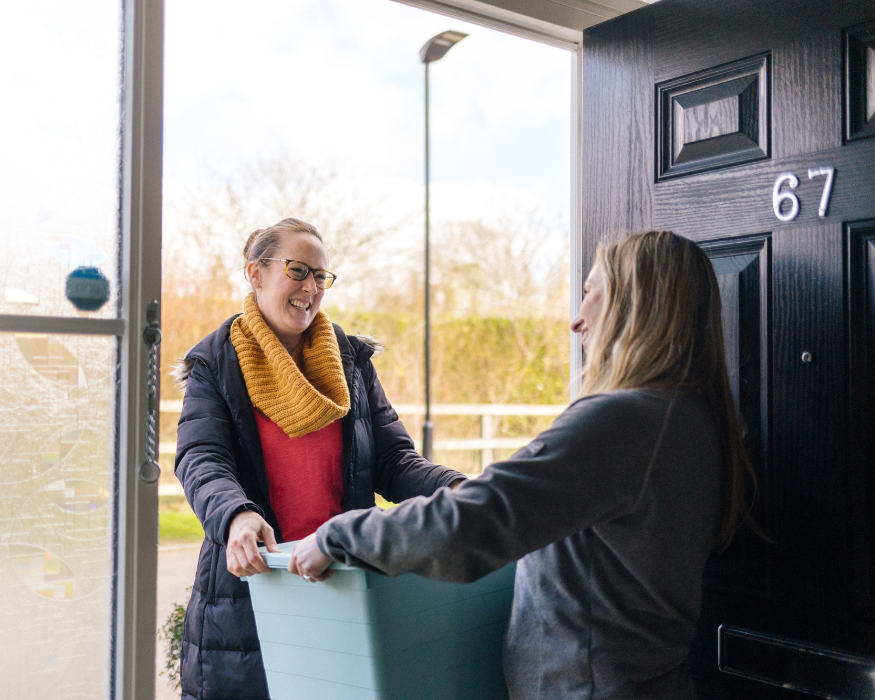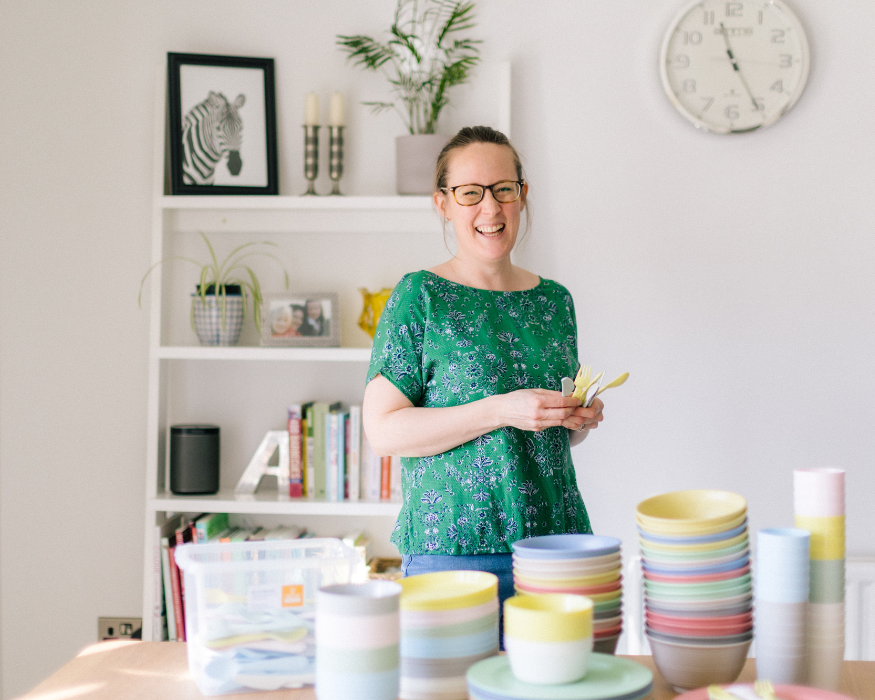It started with a simple box of plates.
In 2019, Isabel Mack came across the idea of neighbours sharing reusable tableware to cut down on the waste created by kids’ parties. It was a simple, thoughtful concept – quiet, local, and practical. But it lit a spark in Isabel that would ripple far beyond her Winchester community.
Today, she leads the Party Kit Network: a global, volunteer-powered movement helping families ditch disposables in favour of shared kits. With nearly 600 members across the UK, Australia, and now the US, the network has helped avoid over a million single-use items. Reusable alternatives have replaced paper plates, plastic forks, cups, and more, passed from hand to hand.
But this isn’t just about birthday bunting or tea sets. It’s a living model of community-led action. Proof that circular solutions don’t need top-down policy to take hold. Just care, connection, and a willingness to start with what you’ve got.
“It’s not a franchise,” Isabel says. “It’s not about profit. It’s about the joy of avoiding waste — together.”
The Spark
The idea didn’t begin with a business plan. It began with a podcast.
Isabel first heard about the concept of a party kit (a box of reusable tableware loaned out for children’s parties) while listening to Jen Gale’s Sustainable(ish) podcast. The episode featured Tilly, a woman who had started lending out her own kit to neighbours to reduce waste.
At the time, Isabel’s son was just entering the birthday party phase. She was already dreading the mountain of paper plates and plastic cups that seemed inevitable and unavoidable
“I thought, surely someone’s already doing this near me,” she recalls.
A quick post in a local parenting group revealed just one other party kit in her wider area. So she reached out. At the same time, Isabel had discovered a website called Zero Waste Near Me, which mapped packaging-free shops and tool libraries. She suggested they add party kits to the directory. They agreed – and asked her to help build the list.
What began as a simple spreadsheet quickly gained momentum. Within two weeks, 40 party kits had joined. A Facebook group followed. Then, a website. Isabel’s background in e-commerce made the leap feel natural.
Within six months, the network had grown to 250 members.
There was no master plan. No commercial ambition. Just a growing sense of purpose and a community saying, yes, this matters.
“It was very organic,” she says. “I didn’t sit down and think: I’m going to start a business. It was more, here’s something that’s working – let’s help more people do it.”

The Model
At its core, the Party Kit Network is a community-powered platform for sharing – not selling.
There’s no central warehouse, no stock inventory, no franchising. Instead, the network connects independent individuals and organisations who each run their own party kit, lending it out to local families. The role of the network is to support, connect, and amplify.
“Everyone owns their own kit,” Isabel explains. “They run it in whatever way works best for their community.”
Some are run by parents from home. Others by school PTAs, a few charities or community centres and local councils. Some kits are lent for free, others for a small donation or fee to support local causes. The flexibility is key as it allows the model to fit different contexts, budgets, and capacities.
Isabel runs her own kit from Winchester, and the income it generates goes straight back into funding the network’s operations. She also receives donations from supporters and a small amount of income through merchandise and occasional sponsorships.
Their total annual spend is modest – just over £1,700 last year. And yet, the reach is growing.
There are no membership fees. No locked-in contracts. Just a shared purpose.
“People always say, ‘Why don’t you just charge a fee?’” Isabel says. “But I don’t want to put barriers in place for the people already taking action. Most of our members are juggling kids, jobs, and other community projects. If I can fund the network in other ways, I will.”
The model in brief:
- Each party kit is owned and managed locally
- Kits include reusable tableware for children’s parties – plates, cups, cutlery, etc.
- Borrowers typically collect and return kits within their community
- The network provides visibility, support, and connection – not oversight
- Operating costs are covered through Isabel’s own kit income, donations, light retail, and occasional sponsorship
“It’s not about profit. It’s about the joy of avoiding waste. Together.”
The Impact
The numbers are powerful – over one million single-use items avoided since 2019. But the deeper impact of the Party Kit Network is harder to quantify, and arguably more profound.
Each kit loaned means fewer disposable cups in landfill. But it also means a parent feels more empowered. A school community comes together. A child sees reuse not as a compromise, but as normal.
“People think it’s about plates,” Isabel says. “But it’s about confidence. About showing people that small actions matter, and they can be joyful.”
In 2023 alone, the network helped avoid over 330,000 disposable items. And while some kits were used dozens of times, others just two or three – every use counted. Every party shifted the norm.
Beyond the data, the ripple effects are growing. Isabel shares the story of Tasha, who started with just one small kit on the island of Jersey. Today, she runs a charity with a dedicated space, a full ‘party library’, and community craft workshops. She and her son were awarded Jersey’s Environmentalist of the Year.
In another case, families discovered their local tool library not through DIY, but through party kits. One small ask — Can I borrow some plates? — opened a wider door to community sharing.
“We’re helping people discover a different way of living,” Isabel says. “It’s not just waste reduction. It’s system change, starting in the home.”
The model is also expanding beyond children’s birthdays. Some members now support local events, PTA fundraisers, and even small festivals. In Winchester, Isabel received a council grant to expand her own adult event kit – proving reuse can scale up as well as out.
The Marketing

For a network built on grassroots energy, the Party Kit Network’s marketing has been equally community-driven.
There’s no slick ad campaign or high-budget media plan. Instead, growth has come through word of mouth, social media, and a quiet presence in places that matter – parenting groups, local events, and environmental forums.
“In the early days, Facebook was huge for us,” Isabel recalls. “It was easier then to build real engagement in groups. People got to know each other, even though most of us will never meet in person.”
That early traction helped build not just visibility, but trust. Members started creating their own content – sharing photos of their kits in use, swap tips, encouragement, and ideas.
To support new joiners, Isabel has developed a resource library filled with posters, templates, and community outreach guides. There are tips on how to connect with local schools, nurseries, eco groups and parents’ networks – all aimed at helping each kit runner feel more confident sharing their offering.
“We’ve got members who are natural community connectors, and others who are more introverted,” she says. “We try to make it easier for everyone to get the word out, in a way that feels right for them.”
Offline, the network has also gained visibility through awards, local council partnerships, and quiet ripples – like a social media badge sent to members who completed the annual audit, which unexpectedly led to new strategic connections across Scotland.
The marketing isn’t flashy. It’s relational. And it works – one conversation, one kit, one celebration at a time.
The Finances
The Party Kit Network runs on generosity, ingenuity, and a remarkably lean budget.
In 2023, total costs came to just over £1,700. That figure covers everything from website maintenance to essential admin – kept low thanks to a volunteer board, a pro bono accountant, and a community willing to pitch in with time and support.
The core income streams are small but sufficient:
- Isabel’s own party kit in Winchester generates around half of the network’s funding
- Donations come from members, borrowers, and supporters who believe in the mission
- Occasional sponsorships and light merchandise sales (like branded t-shirts) contribute small additional funds
“We’re not profit-driven,” Isabel says. “But we do have to cover our costs – and I’ve resisted charging a membership fee because I don’t want to create a barrier for people doing the work.”
For Isabel personally, the project doesn’t generate an income. She’s been able to donate her time thanks to family circumstances and the flexibility of being a stay-at-home parent and recognises the privilege of being able to do this. But with her youngest starting school next year, she’s beginning to think about what sustainability looks like – not just ecologically, but economically.
“I’ll need to figure out whether this can become my job,” she says. “That means exploring how to make the model more financially supportive without compromising the values.”
Ideas are already percolating. From running workshops on sustainable event planning to building partnerships with aligned organisations, there are pathways ahead. But none of them, she emphasises, will come at the cost of the community spirit that made the network thrive.
The Vision
Isabel’s vision is quietly radical. A world where every community has a party kit. Where reuse is normal. And where no child’s celebration ends with a bin full of waste.
“One day, I hope we won’t need the Party Kit Network,” she says. “Because reusables will just be what everyone does.”
That future isn’t built on rapid expansion or aggressive scaling. It’s built on presence. On helping the right people, in the right places, do the right thing and with ease.
Over the next few years, the network’s growth will be focused and grounded:
- Continuing to expand internationally, with new members already joining in the US
- Deepening impact in schools, through a kit programme that supports PTAs to lend kits for birthday parties and picnics
- Supporting more adult event kits, with infrastructure to serve larger community gatherings
- Building strategic partnerships that bring in funding without diluting the mission
- Exploring content and training as a new income stream – from workshops to toolkits on running sustainable events
Isabel’s hope is not just to reduce single-use waste, but to make reuse visible, accessible, and joyful.
“If kids grow up thinking reusable plates are just what you use at a party, that’s a shift. That’s culture change.”
She knows the work won’t always be hers forever. But the ripples already reach far beyond what she imagined. Her role, for now, is to keep tending to the network – quietly, locally, together.
“We’re helping people discover a different way of living. It’s not just waste reduction. It’s system change, starting in the home.”
The Challenges
For all its warmth and impact, running the Party Kit Network hasn’t been easy. Especially when choosing community over commerce.
One of the biggest hurdles has been trying to fit a values-led, volunteer-powered model into a system designed for either business or charity – but rarely both.
“We don’t quite fit anywhere,” Isabel says. “We’re not a traditional business, and we’re not a typical charity. That’s made things like funding, banking, even networking feel harder.”
She’s had to navigate practical limitations too. Choosing greener technology, for example, often means higher costs. Web hosting, packaging, even eco-friendly tableware – all come with trade-offs. At times, she’s had to choose plastic for its durability, safety, and longevity, despite a preference for alternatives.
“There’s no perfect option,” she says. “You just have to choose the best available one, with the information you have.”
The pandemic was another major challenge. Just six months after launch, everything stopped. With parties off the table, the network had to pause and regroup. In that time, Isabel formalised the legal structure and reconnected with the deeper purpose of the work – but rebuilding momentum afterwards took time.
Now, as the network grows again, a new challenge is surfacing: where to find community. Isabel doesn’t feel at home in typical small business spaces, nor in the charity sector. The work sits in between.
“It can be lonely,” she admits. “Especially when you’re doing something that doesn’t quite fit the mould.”
Yet even these challenges have seeded new connections – often unexpectedly. A simple awards badge led to a new partnership in Scotland. A school eco council led by Isabel revealed just how much children already understand about sustainability. The way forward isn’t always clear. But the next step usually is.
The Mindset
Isabel’s approach to leadership is quietly steadfast. Rooted in care, community, and a deep belief that small actions can lead to big shifts.
She doesn’t see herself as a CEO or a campaigner. She sees herself as a facilitator. Someone who clears the path, makes it easier for others to take action, and listens to what’s needed next.
“I’ve got nearly 600 people keeping me accountable,” she says. “Every decision I make, I think — would I be happy explaining this to the community?”
That principle of transparency runs deep. Isabel regularly shares decisions, dilemmas, and updates with members through newsletters, polls, and Facebook posts. Sometimes it’s to gather feedback. Other times, it’s to honour the trust the network is built on.
She also leans into collaboration. The Party Kit Network isn’t hers alone – it’s shaped by everyone who contributes. Ideas come from members. Improvements come from lived experience. And friendships, like her connection with Becca from TenShare, offer both practical support and emotional encouragement.
“I was struggling to understand why things felt so hard,” Isabel says. “Then I read John Alexander’s book Citizens and it made sense. We’re trying to build something in a system that’s not designed for it.”
Her mindset blends realism with hope. She knows there are limits to what one person can do – especially with a young family and limited time. But she also knows that consistency, kindness, and clarity can carry a long way.
In a world that often rewards speed and scale, Isabel is choosing depth and direction.

The Wisdom
Isabel’s journey has been shaped by trial, error, listening, and care. For anyone looking to build a purpose-driven project, her advice is practical, grounded, and gently encouraging.
- Start before you feel ready
“I spent ages procrastinating over the legal structure. When the certificate finally came, I thought – oh, that was it?” - Find your people
Seek out others who share your values, even if their work looks different. Collaboration can come from surprising places. - Remove friction where you can
Make it easy for people to take action. That might mean waiving fees, offering templates, or just being there with encouragement. - Ask for help early
Don’t wait until you’re overwhelmed. People often want to support – they just need to be invited in. - Let go of perfection
Whether it’s the ideal tableware or the perfect tech, sometimes good enough is good enough. Impact matters more than optics.
Try This
Inspired by Isabel’s journey? Here are five practical steps you can take to bring more reuse, purpose, and community connection into your own work.
- Map what already exists near you
Look for local sharing schemes, tool libraries, or zero waste initiatives. You might find untapped allies – or gaps you can help fill. - Start a party kit in your community
It doesn’t take much – a set of reusable plates, a storage box, and a willingness to lend. Visit partykitnetwork.org for guidance. - Support someone who’s already doing the work
Not ready to start your own? Donate to a local kit, share their posts, or offer practical help like washing up or transport. - Talk to your local school or PTA
Suggest a school-based party kit to support fundraising and reduce waste. It’s a great way to involve children and parents alike. - Celebrate the impact, not just the idea
Keep track of what you’re saving – plates reused, bins not filled. Share those wins. They’re powerful reminders that small shifts add up.
We love sharing stories of thoughtful businesses building a better future. If this one inspired you, why not pass it on? And if you have your own good growth story – or know someone whose journey we should tell – we’d love to hear from you.

